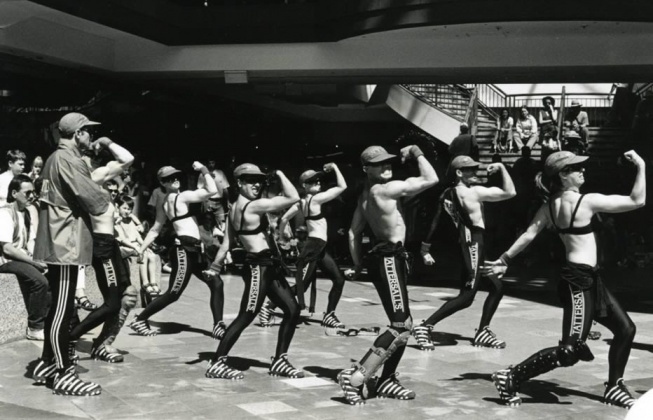David Pledger is an award winning contemporary artist and curator working in the performing, visual and media arts. Regularly exploring universal ideas like the relationship between art and politics, architecture, sport, science, the environment and technology he’s a vital voice within Australia’s arts scene.
Beyond his practice though, David is active in highlighting the inadequate treatment of Australian artists and creatives. Via his well-researched writing on the subject, he clearly demonstrates the increasingly glaring shortfalls of government policy and art funding in the country. Essentially, he argues, artists are being underpaid and undervalued while bolstering a healthy industry in which everyone on the periphery is being more fairly rewarded.
A report commissioned last year by Entertainment Assist, an agency dedicated to supporting the mental health of Australian entertainment industry workers, revealed an unsurprising link between mental health issues and the insecure conditions and underpayment prevalent within the arts. The report reveals that these workers suffer from the effects of uncertain employment, low pay, shift work and unrealistic expectations leading to regular cases of depression and anxiety.
In response, David has asked us to think about what would happen if all working artists were to strike. Once we start to imagine our world without actors, dancers, musicians, choreographers, composers, designers, directors, sculptors, photographers, writers and artists, we start to truly understand their value. With Australian Council funding in potentially further jeopardy at this election, we spoke to David about the issue he feels so strongly about.
Your work in the area of artist’s rights is so important. Do you see a lot of mental health issues in the arts?
The mental health side of things isn’t what I focus on as my work is more related to social wellbeing, cultural health and the development of one’s practice. There’s no doubt that the connection between the two is fairly direct—it’s related to self-worth and whether you’re being paid properly for what you do as opposed to being exploited.
And you introduced the idea of a widespread strike to address the issue?
I basically called for a National Artist strike a few years ago. The idea was to try to draw attention to the way artists tend to be exploited, not directly through Government assistance, but through the way in which the Arts sector has been configured.
What do you think is at the heart of the problem?
Artists don’t tend to be strong advocates for themselves and as a result they often have other people represent them who they need to pay. In this way there’s a distance between the artist and the money in the chain. There’re a lot of middle-men in the arts sector, which is incredibly problematic. I say that you can’t call it an industry because the majority of primary workers are actually living below the poverty line. In any industry it’s the primary producers who necessarily need to be paid in order to make the whole industry sustainable, but it’s not happening in the arts.
It’s so important for a culture to support artists.
We need artists to have the freedom to create their work, to basically piss people off, to ignore, to object, and to develop new practices or new ways of thinking in order for all kinds of development to occur, whether it’s economic, cultural or social. The role of the artist is absolutely intrinsic to development as a society and also for the health of a democracy.
Going back to the strike, what was the reaction from the artistic community?
What I was hoping to do was to put the idea out there so it was able to take hold in people’s imaginations. I wanted artists to really see the value of their work by imagining a world without it. I wanted to demonstrate the power they actually have because if artists were to actually withdraw their labour, and the products of their labour, there would no reason for many institutions to exist. It really sparked lots of conversations about the artists’ worth and their chances of sustainability and this awareness is vital.
What could this July 2nd election mean for the situation?
The reality is that if the Labour Party gets in, they will set aside money for the Australian Council and if the Coalition wins they will keep taking it away. Last year they took $70 million away from the council and while it’s fairly dysfunctional, it’s still the best place for public tax to be disseminated to arts organisations. It’s really vital that it continues to receive funding for the good of the arts.
Credits
Text Briony Wright
Image from a performance work called Training Squad.
